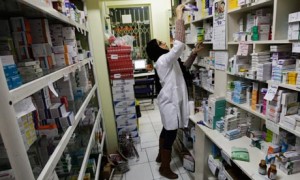 Economic sanctions against Iran are affecting the availability of essential and life-saving drugs in the country, forcing patients to turn to an unregulated black market. Dara Mohammadi reports.
Economic sanctions against Iran are affecting the availability of essential and life-saving drugs in the country, forcing patients to turn to an unregulated black market. Dara Mohammadi reports.�Some of my patients can't get the drugs they need�they are left thinking that this is the end for them�, explains Daryoush Sharif (not his real name), a clinician working in Tehran. �Sometimes I have to collect money from my more well-to-do patients so that they [the poorer patients] can buy medication. It makes practising medicine in this country hard at the moment, having to observe people suffering like this.�
Sharif's situation is not unfamiliar to many clinicians across Iran. US-led sanctions�imposed to force Iran's hand into negotiations over its uranium-enrichment programme�have sent the country's economy into a tailspin, taking the national drug supply with it. Although exemptions are in place for the trade of medical and humanitarian goods, the plummeting value of the rial (down 80% against the dollar since the beginning of 2012) and the reluctance of pharmaceutical companies and banks to risk severe fines or their reputation by dealing with Iran, have left the country severely short on drugs.
�The [drug supply] situation wasn't that great before�, Sharif explains, �but these sanctions have made things worse. No doubt about it.� The supply of drugs is short for disorders across the board�from cancer to diabetes, heart disease to multiple sclerosis�and, when available, can be prohibitively expensive for many people: some drugs have increased in price by as much as three times over the past year. Patients who can afford these prices have stock-piled, further adding to the shortage. �Supply of expensive, imported drugs has been most affected, but sometimes even the cheapest drugs aren't available�, he adds.
Unable to afford their much-needed and sometimes life-saving drugs, or turned away from empty pharmacies, patients have few options. One is to ask friends and family living abroad to send them drugs. But this is by no means straightforward: it requires doctors in other countries to contravene prescription laws and prescribe to an unseen patient; even if drugs are obtained, they need to be sent to neighbouring countries and carried over the Iranian border by hand.
Then there's another option. Naser Khosrow Street, near the main bazaar in Tehran's old city, has been the site of a small-scale black market for pharmaceuticals for decades, but Iran's recent financial woes have seen it flourish of late. Although licensing and regulation laws don't apply here�the drugs are often of poor quality or out of date�market laws certainly do: the combination of rampant demand and strangled supply has shot prices through the roof. Traders are purported to be selling drugs at up to four times their market price, casting the poorest populations further adrift.
Reza Malekzadeh was Iran's Minister of Health from 1991 to 1993, and is currently professor of medicine at Tehran University of Medical Sciences. He explains to�The Lancet�that data are not yet available to quantify the exact effects of the sanctions in terms of morbidity or mortality, but that the problem is abundantly apparent to everybody in the country, especially to physicians. �The degree of suffering is huge�, he says. �We're just trying to do our best for our patients. We don't have the figures, but I can say that almost 60% of cancer patients in Iran�and we have about 50�000 cancer cases per year�are in trouble. If they can't have therapy in time and we cannot treat them, then their survival will become shortened.�
Iran produces about 90% of its own drugs, but its domestic market is also struggling. Malekzadeh explains how Iranian pharmaceutical companies are finding it difficult to bring in active ingredients from abroad, pointing out that sanctions on shipping insurance make movement of any purchased goods practically impossible. The purchasing of medical equipment is also becoming increasingly difficult. �We are not even able to buy endoscopy instruments, which are very simple things�, he says, emphasising the need for western governments to reassess the logistics of these exemptions, to make sure that they truly work. �To us, it seems like western powers have decided to punish the Iranian people.�
Malekzadeh is not the only Iranian thinking like this. Sharif sums up the feelings among him and his colleagues at the clinic-level: �These sanctions are more than against the government�the effect is now on the people.�
As�The Lancet�went to press, negotiations were ongoing between Iran and India for the purchase of some 28 types of drugs. With the medical crisis unfolding across much of the country, and the ill-feeling brewing towards the west, it seems that such a shipment is much needed.
By The Lancet
The Iran Project is not responsible for the content of quoted articles.










